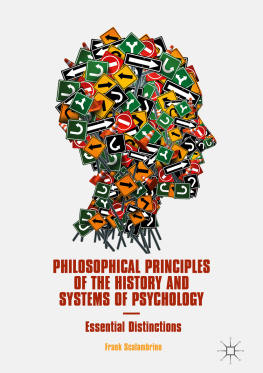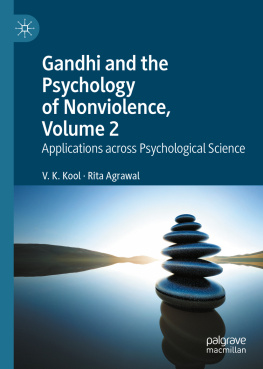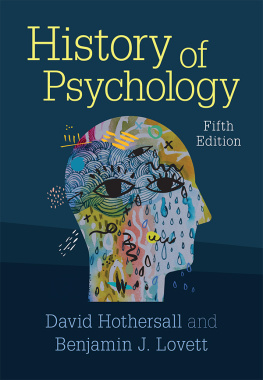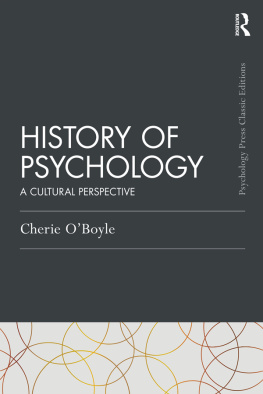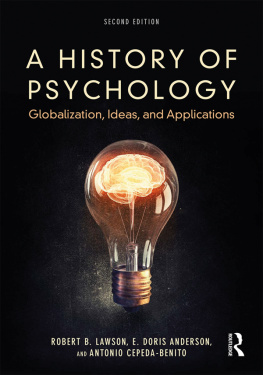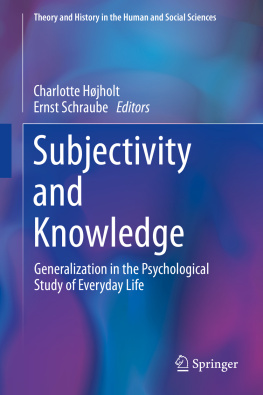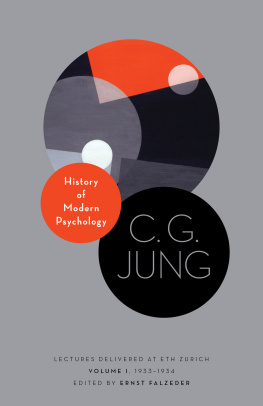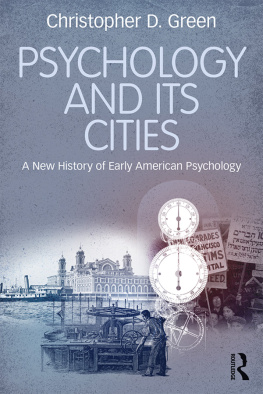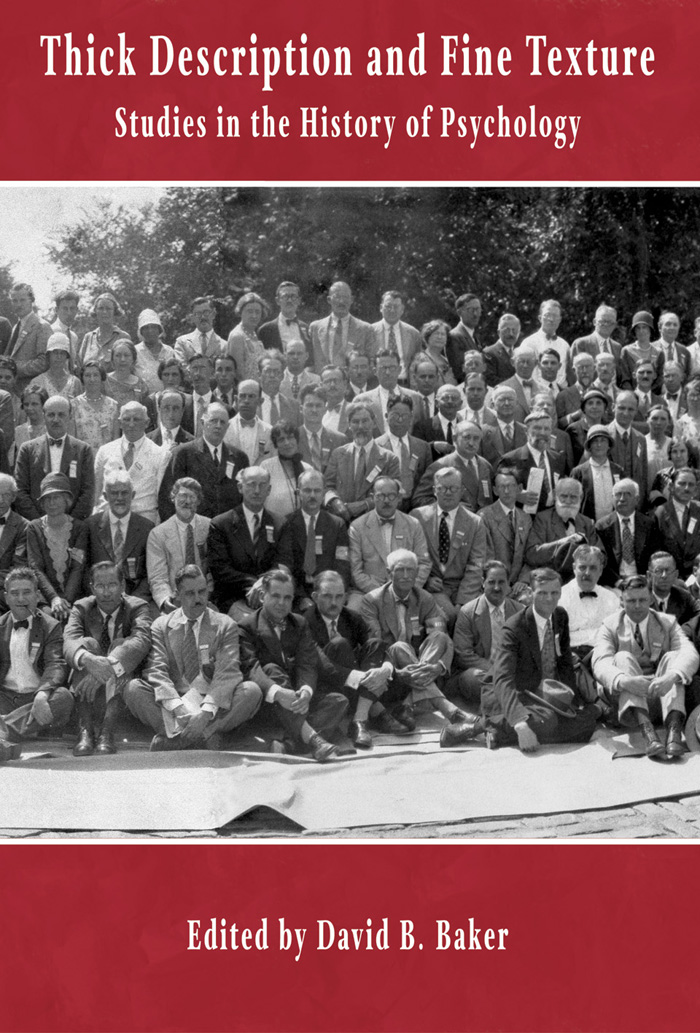Thick Description and Fine Texture
Also of Interest
John A. Popplestone and Marion White McPherson,
An Illustrated History of American Psychology
J. R. Kantor
Psychology and Logic
The Logic of Modern Science
The Scientific Evolution of Psychology
The Aim and Progress by Psychology and Other Sciences
The Science of Psychology: An Interbehavioral Survey
Cultural Psychology
Tragedy and the Event Continuum
Psychological Comments and Queries
Principles of Psychology
The University of Akron Press
Akron, Ohio

Thick Description and Fine Texture:
Studies in the History of Psychology
Edited by David B. Baker
Copyright 2003 David Baker
All rights reserved
All inquiries and permissions requests should be addressed to the publisher,
The University of Akron Press, Akron, OH 443251703.
Manufactured in the United States of America
First edition 2003
07 06 05 04 03 5 4 3 2 1
Library of Congress Cataloging-in-Publication Data
Thick description and fine texture : studies in the history of
psychology / edited by David B. Baker. 1st ed.
p. cm.
Includes bibliographical references and index.
ISBN 193196802-0 (alk. paper)
1. PsychologyHistoriography. I. Baker, David B. II. Title.
BF81.T47 2003
150'.7'22dc22
2003021622
The paper used in this publication meets the minimum requirements of American National Standard for Information SciencesPermanence of Paper for Printed Library Materials, ANSI z39.481984.
Contents
Essays in Honor of John A. Popplestone and Marion White McPherson
David B. Baker
Looking Backward
John A. Popplestone and Marion White McPherson
Thick Description and The Fine Texture of the Past
Michael M. Sokal
A Not-Very-Satisfactory Bottom Line
John C. Burnham
Ludy T. Benjamin Jr.
The Diaries of Walter Miles
C. James Goodwin
Working with the Henry Herbert Goddard Papers
Leila Zenderland
Hendrika Vande Kemp
The Rise of Statistical Instruments in Psychology, 19001950
Ryan D. Tweney
Donald A. Dewsbury
York Universitys History of Psychology Program and the Archives of the History of American Psychology
Raymond E. Fancher
PREFACE
Thirty-five Years of Archival Achievement:
Essays in Honor of John A. Popplestone and Marion White McPherson
David B. Baker
TO HONOR THE CONTRIBUTIONS of significant persons, the academic world has at its disposal any number of award mechanisms. Most ubiquitous are items that become the private property of the recipient, including honorary degrees, all manner of chronometers, and countless variations of engraved decorative icons. Once bestowed, the gift and recipient are often relinquished to a restive setting, removed from the currents they once occupied.
In the hierarchy of academic acknowledgment, being honored with a collection of essays generally indicates that a persons legacy is lasting and relevant. Unlike acknowledgments that inhabit personal spaces, these works reside in the public domain and serve as a perpetual reminder of past accomplishment and contribution. And so it is with this volume that pays tribute to two pioneers in the history of psychology, John A. Popplestone and Marion White McPherson.
Their founding of the Archives of the History of American Psychology at the University of Akron in 1965 was a watershed event in the history of psychology in the twentieth century. In bringing together the primary sources in the history of psychology, they brought a new legitimacy to the study of the subject. Historians of psychology had a place to hang their hat, historiography gained muscle, and scholarship broadened.
To honor their legacy a festschrift conference was convened at A vestige of nineteenth-century German academic life, the festschrift was conceived as an expression of esteem from students who had profited from the mentorship of a beloved and accomplished professor. For Popplestone and McPherson, the archives were their university office and historians of psychology their students. Indeed their reach was far and wide, touching not only the lives of individual scholars but also shaping the corpus of the new history of psychology that was emerging in the 1960s. Shepherding this new movement from its infancy through the centurys end, they created, challenged, provoked, and persevered to leave a record that has no equal.
Who better then to begin this volume than the founders themselves, answering several questions demanded by the historical record. Following the introduction, nine distinguished scholars in the history of psychology share in the reflected glory of the good works of Popplestone and McPherson. The composition of the authors reflects much of the contemporary scene in the history of psychology. Some are historians and some psychologists, all keenly aware of the primacy of original source material in historical scholarship. Each was invited to reflect upon the process of archival research.
As with any selected work the reader is free to read at will, the essays offering insights into a myriad of issues familiar to anyone who has reached for an archival folder or considered the provenance of an artifact. As one considers these diverse and informing essays, what emerges is a sense of the journey available through archival research. The panoply of available methods reminds us that historiography is dynamic and continually open to new interpretation and knowledge. The ways in which individual writers collate archival elements to produce a coherent narrative also reminds us that such undertakings are a human endeavor, capable of inducing a range of affect and experience. It seems fair to say that the journey is a satisfying one.
The opening essays, offered by two established editors in the history of psychology, Professor Michael Sokal and Professor John Burnham, provide a focused and personal examination of some of the tools and techniques of historical analysis. Sokals discussion of microhistory offers a range of possibilities for considering the data of individual lives, whereas Burnham brings the reader along in his search for meaning in the use of oral history.
The genre of historical biography is well represented in the papers of Professors Ludy T. Benjamin Jr., C. James Goodwin, and Leila Zenderland. Interestingly, each of the biographical subjects is part of a cohort whose careers reached full stride in the second and third decades of the twentieth century. Benjamin shows in detail how a seeming paradox of identity can be unfolded through an examination of personal and professional personas. Goodwin offers a perspective on the use of personal diaries, illustrating that the vagaries of autobiographical note taking can offer valuable insights into the interaction of person and place. Expanding the scope, Zenderland carefully walks the reader through the steps involved in deconstructing social policy to reveal the influence of the personal, professional, and political.
Just as biography provides rich historical narrative, so too do the tensions in the culture at large. The essay offered by Professor Hendrika Vande Kemp illustrates how one can take on a topic of massive proportions and in the process distill some essential facts and provide credence to areas of neglected historical analysis.


